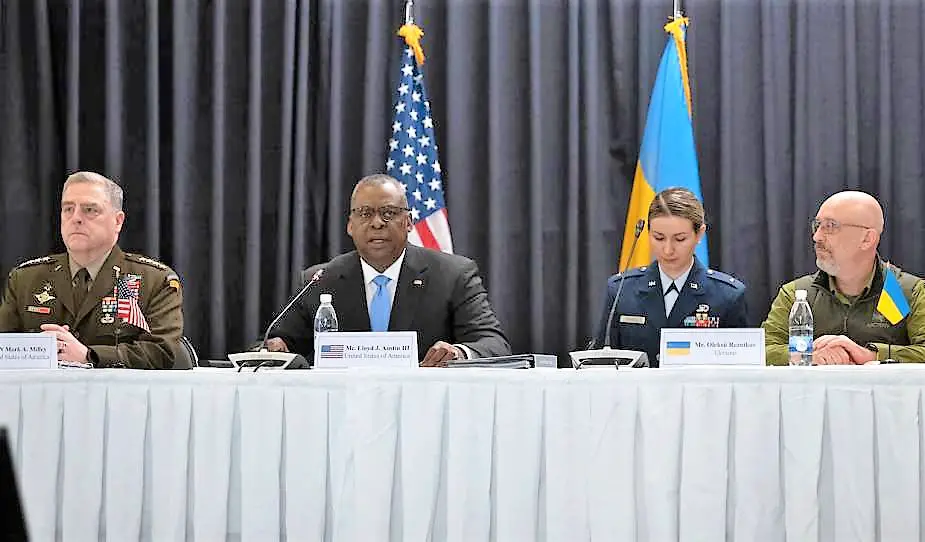Breaking news
Weapons and equipment sent to Ukraine have an effect on battlefields.
As reported by Jim Garamone, U.S. Department of Defense, the equipment being sent to Ukraine is having an effect on the battlefield, Pentagon Press Secretary John F. Kirby said on April 27. The equipment is making a difference on the battle lines in the Donbas region — the site of the major Russian effort in Ukraine.
Follow Army Recognition on Google News at this link

U.S. Secretary of Defense Lloyd J. Austin III speaks at the Ukraine Defense Consultative Group meeting at Ramstein Air Base, Germany, April 26, 2022 (Picture source: U.S. DoD)
Kirby, who just returned from a trip with Secretary of Defense Lloyd J. Austin III to Europe, said the fight in the Donbas is active and kinetic. Ukrainian officials told Austin that the equipment — coming from 40 different countries — is allowing Ukrainian forces to hold their own against the Russian invasion.
In Europe, Austin said the United States and partner nations will continue to get the equipment and supplies the Ukrainians need to the country, Kirby said. Munitions continue to flow into Ukraine, as well as weapon systems. Kirby said that more than half of the U.S. howitzers are in Ukraine today and that the first tranche of Ukrainian soldiers has been trained in how to use the operation of that system. Those soldiers will go back to Ukraine and teach their fellow soldiers as those batteries stand up.
Ukraine's military needs change day to day, Kirby said, and U.S. officials are in constant contact with them to ensure the right mix arrives in time to make a difference. "We know they're expending rounds, every single day, of all different types and calibers," Kirby said. "And we're doing everything we can to continue to make sure that they can stay fight."
Austin chaired a meeting of nations involved in supporting Ukraine at Ramstein Air Base, Germany. Over two months into the war in Ukraine, these partners are examining the vitality of the defense industrial base. They are doing this "because we know whatever happens here, and however this war ends, the security landscape in Europe has changed: Not is changing, not will change. It's changed now based on what Putin has done," Kirby said.
This change affects U.S. service members as well. Secretary Austin ordered thousands of personnel to Europe to strengthen NATO forces in advance of Russia's invasion of Ukraine. Those forces are still there. The American footprint in Europe is now well over 100,000 service members with some permanently assigned there, others on rotational orders and some on temporary deployments. There have been no redeployments back to the United States, Kirby said. "We're still working our way through what that's going to look like in coming months," he said.
Secretary Austin and Army Gen. Mark Milley, the chairman of the Joint Chiefs of Staff, look at force posture around the world every day. Russia's invasion of Ukraine has changed the strategic environment. While there hasn't been a decision yet on redeployments or replacements for troops ordered to Europe, there are discussions within DOD on what the U.S. footprint in Europe should look like, Kirby said.
The press secretary said DOD officials will also reach out to allies and partners for their input. "Those kinds of consultations haven't started yet, but I can tell you that the secretary wants us to start thinking about what a European footprint should look like, again, because the landscape has definitely changed."





























